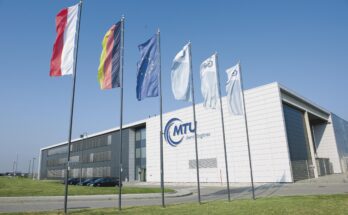by Richard Pettibone, Aerospace & Defense Companies Analyst, Forecast International.
After a summer of speculation, United Technologies Corp (UTC) and Rockwell Collins announced that they have reached a definitive agreement under which UTC will acquire Rockwell Collins in a cash and stock transaction valued at $30 billion.
Rockwell Collins is a world leader in the production of aviation electronics and airborne and mobile communications products and systems for commercial and military applications. The company focuses on its core markets of communications, navigation, automated flight control, display/surveillance, simulation and training, integrated electronics, and information management systems. Most recently, the company added aircraft interiors to its portfolio with the acquisition of B/E Aerospace in early 2017.
“This acquisition adds tremendous capabilities to our aerospace businesses and strengthens our complementary offerings of technologically advanced aerospace systems,” said UTC Chairman and Chief Executive Officer Greg Hayes. “Together, Rockwell Collins and UTC Aerospace Systems will enhance customer value in a rapidly evolving aerospace industry by making aircraft more intelligent and more connected.”
“The integrated companies’ expertise in developing electrical, mechanical and software solutions will allow us to deliver more innovative products and services and provide greater value to our customers and shareowners,” Hayes continued. “This combination will also create new opportunities for the talented employees of both companies to advance innovation in a growing and dynamic industry.”
Under the terms of the agreement, each Rockwell Collins shareowner will receive $93.33 per share in cash and $46.67 in shares of UTC common stock, subject to a 7.5 percent collar centered on UTC’s August 22, 2017 closing share price of $115.69. UTC expects to fund the cash portion of the transaction consideration through debt issuances and cash on hand, and the company is committed to taking actions to maintain strong investment grade credit ratings. The transaction is projected to close by the third quarter of 2018, subject to approval by Rockwell Collins’ shareowners, as well as other customary closing conditions, including the receipt of required regulatory approvals.
The purchase price implies a total equity value of $23 billion and a total transaction value of $30 billion, including Rockwell Collins’ net debt.
On a pro-forma 2017 basis, UTC is expected to have global sales of approximately $67 to $68 billion following the transaction, based on estimated results.
Upon completion of the transaction, Rockwell Collins and UTC Aerospace Systems will be integrated to create a new business unit named Collins Aerospace Systems. Kelly Ortberg, current CEO of Rockwell Collins, will assume the role of chief executive officer, with Dave Gitlin, current UTC Aerospace president, serving as president and chief operating officer. While not announced by the firms, the appointment of Ortberg as CEO leads to speculation that the new Collins Aerospace Systems headquarters may be shifted to Cedar Rapids, Iowa, rather than to Charlotte, North Carolina, UTC Aerospace Systems’ current headquarters.
This is not UTC’s first aerospace merger rodeo. In 2016, Honeywell offered to buy United Technologies for many of the same reasons. A combined UTC-Honeywell would have owned substantial content on many aircraft programs, thus decreasing competition and increasing the combined firm’s marketing power. It’s no wonder, then, that many aircraft OEMs were quite vocal in their opposition to the deal. Facing such heat, Honeywell backed away from the proposal. However, as these same OEMs continue to put pricing pressure on their suppliers, the need to consolidate and reduce costs remains.
By combining operations, the new Collins Aerospace Systems will have greater leverage in negotiating cost-reduction agreements. Such a merger would enable the combined firm to offer nose-to-tail components to OEMs. Rockwell Collins – which makes cabin and flight deck components, military equipment, and other parts – would complement, with little overlap, UTC Aerospace Systems’ existing product line. More importantly, the smaller scale of the company’s relative size – Rockwell’s roughly $8 billion in sales versus the $15 billion in additional sales of a UTC/Honeywell merger – should make the deal more palatable to anti-trust regulators and OEMs.
Industry OEMs have also chimed in on the tie-up. Airbus stressed that UTC must focus on getting the Pratt & Whitney Geared Turbofan (GTF) engine program back on track. The PW1100G engines have been dogged by launch problems, earning the quiet ire of customers such as Airbus and Bombardier as deliveries were delayed. By mid-2017 it appeared that the program had turned the corner, with most of its technical and production problems behind it. The company has addressed the technical problems and stabilized its supply chain. With these issues addressed, Pratt should be able to hit its goal of producing 350-400 engines in 2017.
The Wall Street Journal is reporting that Boeing is down on the deal and has threatened to cancel some contracts should the new entity reduce competition. This is very similar to Boeing’s problems with the earlier merger attempt of UTC and Honeywell, though that deal had more overlapping market areas.
Further down the road, UTC may look at rebalancing its portfolio as it seeks to offset the cost of this acquisition. There will likely be smaller divestments of non-core operations as the melding of the two operations begins. The bigger question is, will UTC make a larger divestment in its commercial operations? The company might make a small sale here, again of a non-core unit, but overall the firm has operated well under the conglomerate principle of balancing its diverse markets so that when one is down, the other (hopefully) is up.
The Defense & Aerospace Companies series focuses on worldwide aerospace and defense prime contractors and subcontractors. Concise reports provide data on individual corporations regarding recent mergers, restructurings, and joint ventures, along with a Strategic Outlook that examines the company’s strengths, weaknesses, and opportunities. Also included in each report are financial and industrial segment data, snapshot coverage of major aerospace and defense programs, and recent U.S. Department of Defense contract awards.
A military history enthusiast, Richard began at Forecast International as editor of the World Weapons Weekly newsletter. As the Internet grew in importance as a research tool, he helped design the company's Forecast Intelligence Center and currently coordinates the EMarket Alert newsletters for clients. Richard also manages social media efforts, including two new blogs: Defense & Security Monitor, covering defense systems and international issues, and Flight Plan, which focuses on commercial aviation and space systems. For over 30 years, Richard has authored the Defense & Aerospace Companies, Volume I (North America) and Volume II (International) services. The two books provide detailed data on major aerospace and defense contractors. He also edits the International Contractors service, a database that tracks all the contractors involved in the programs covered in the FI library. More recently he was appointed Manager, Information Services Group (ISG), a new unit that encompasses developing outbound content for both Forecast International and Military Periscope.




